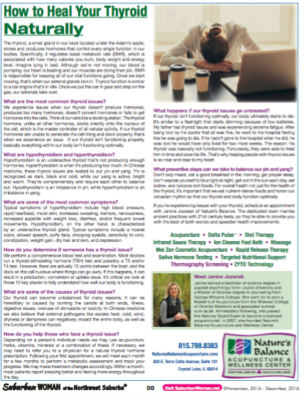By: Janine Jozwiak, Nature’s Balance Acupuncture & Wellness Center
How to Heal Your Thyroid Naturally
The thyroid, a small gland in our neck located under the Adam’s apple, stores and produces hormones that control every single function in our bodies. Specifically, it regulates basal metabolic rate (BMR), which is associated with how many calories you burn, body weight and energy level. Imagine lying in bed. Although we’re not moving, our blood is pumping, our heart is beating and our muscles are doing their job. BMR is responsible for keeping all of our vital functions going. Once we start moving, that’s when our adrenal glands kick in. Thyroid function is similar to a car engine that’s in idle. Once we put the car in gear and step on the gas, our adrenals take over.
What are the most common thyroid issues?
We experience issues when our thyroid doesn’t produce hormones, produces too many hormones, doesn’t convert hormones or fails to get hormones into the cells. Think of our cells like a docking station. The thyroid hormone, unlike all other hormones, docks directly onto the nucleus of the cell, which is the master controller of all cellular activity. If our thyroid hormones are unable to penetrate the cell lining and dock properly, that’s when we experience an issue. If our thyroid isn’t functioning properly, basically everything within our body isn’t functioning optimally.
What are hypothyroidism and hyperthyroidism?
Hypothyroidism is an underactive thyroid that’s not producing enough hormones. Hyperthyroidism is when it’s producing too much. In Chinese medicine, these thyroid issues are related to our yin and yang. Yin is recognized as dark, black and cold, while our yang is active, bright and warm. They’re complementary and require each other to balance out. Hypothyroidism is an imbalance in yin, while hyperthyroidism is an imbalance in yang.
What are some of the most common symptoms?
Typical symptoms of hyperthyroidism include high blood pressure, rapid heartbeat, moist skin, increased sweating, tremors, nervousness, increased appetite with weight loss, diarrhea, and/or frequent bowel movements. Hypothyroidism, on the other hand, is characterized by an underactive thyroid gland. Typical symptoms include a hoarse voice, slowed speech, puffy face, drooping eyelids, sensitivity to cold, constipation, weight gain, dry hair and skin, and depression.
How do you determine if someone has a thyroid issue?
We perform a comprehensive blood test and examination. Most doctors run a thyroid-stimulating hormone (TSH) test and possibly a T3 and/or T4 test. However, there are actually 10 points between the brain and the dock on the cell nucleus where things can go awry. If this happens, it can result in a production, conversion or uptake issue. It’s critical we look at those 10 key places to fully understand how well our body is functioning.
What are some of the causes of thyroid issues?
Our thyroid can become unbalanced for many reasons. It can be hereditary or caused by burning the candle at both ends, illness, digestive issues, overuse of stimulants or toxicity. In Chinese medicine we also believe that external pathogens like excess heat, cold, wind, dryness or dampness can negatively impact the entire body, as well as the functioning of the thyroid.
How do you help those who face a thyroid issue?
Depending on a person’s individual needs we may use acupuncture, herbs, vitamins, minerals or a combination of these. If necessary, we may need to refer you to a physician for a natural thyroid hormone prescription. Following your first appointment, we will meet each month for a few months to perform a metabolic assessment and track your progress. We may make treatment changes accordingly. Within a month, most patients report sleeping better and feeling more energy throughout the day.
What happens if our thyroid issues go untreated?
If our thyroid isn’t functioning optimally, our body ultimately starts to die. It’s similar to a flashlight that starts dimming because of low batteries. My father had thyroid issues and was experiencing extreme fatigue. After being told by his doctor that all was fine, he went to the hospital feeling like he was going to die. If he hadn’t gone to the hospital when he did, he was told he would have only lived for two more weeks. The reason: his thyroid was basically not functioning. Fortunately, they were able to treat him in time and save his life. That’s why helping people with thyroid issues is so near and dear to my heart.
What preventive steps can we take to balance our yin and yang?
Don’t skip meals, eat a good breakfast in the morning, get proper sleep, don’t expose yourself to blue light at night, get out in the sun each day, eat iodine- and tyrosine-rich foods. For overall health not just for the health of the thyroid, it’s important that we eat nutrient-dense foods and honor our circadian rhythm so that our thyroid and body function optimally.
If you’re experiencing issues with your thyroid, schedule an appointment with Janine Jozwiak of Nature’s Balance. The dedicated team marries ancient practices with 21st century tests, so they’re able to provide you with the best of both worlds and speedier health improvements.

